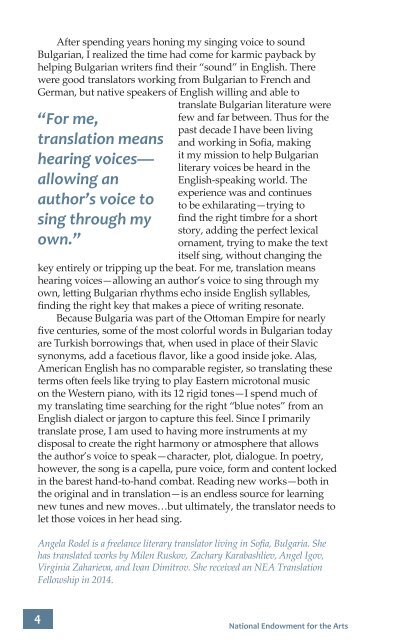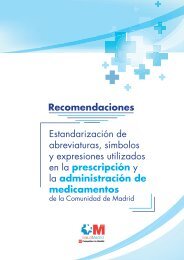lKd7nD
lKd7nD
lKd7nD
You also want an ePaper? Increase the reach of your titles
YUMPU automatically turns print PDFs into web optimized ePapers that Google loves.
After spending years honing my singing voice to sound<br />
Bulgarian, I realized the time had come for karmic payback by<br />
helping Bulgarian writers find their “sound” in English. There<br />
were good translators working from Bulgarian to French and<br />
German, but native speakers of English willing and able to<br />
translate Bulgarian literature were<br />
“For me,<br />
translation means<br />
hearing voices—<br />
allowing an<br />
author’s voice to<br />
sing through my<br />
own.”<br />
few and far between. Thus for the<br />
past decade I have been living<br />
and working in Sofia, making<br />
it my mission to help Bulgarian<br />
literary voices be heard in the<br />
English-speaking world. The<br />
experience was and continues<br />
to be exhilarating—trying to<br />
find the right timbre for a short<br />
story, adding the perfect lexical<br />
ornament, trying to make the text<br />
itself sing, without changing the<br />
key entirely or tripping up the beat. For me, translation means<br />
hearing voices—allowing an author’s voice to sing through my<br />
own, letting Bulgarian rhythms echo inside English syllables,<br />
finding the right key that makes a piece of writing resonate.<br />
Because Bulgaria was part of the Ottoman Empire for nearly<br />
five centuries, some of the most colorful words in Bulgarian today<br />
are Turkish borrowings that, when used in place of their Slavic<br />
synonyms, add a facetious flavor, like a good inside joke. Alas,<br />
American English has no comparable register, so translating these<br />
terms often feels like trying to play Eastern microtonal music<br />
on the Western piano, with its 12 rigid tones—I spend much of<br />
my translating time searching for the right “blue notes” from an<br />
English dialect or jargon to capture this feel. Since I primarily<br />
translate prose, I am used to having more instruments at my<br />
disposal to create the right harmony or atmosphere that allows<br />
the author’s voice to speak—character, plot, dialogue. In poetry,<br />
however, the song is a capella, pure voice, form and content locked<br />
in the barest hand-to-hand combat. Reading new works—both in<br />
the original and in translation—is an endless source for learning<br />
new tunes and new moves…but ultimately, the translator needs to<br />
let those voices in her head sing.<br />
Angela Rodel is a freelance literary translator living in Sofia, Bulgaria. She<br />
has translated works by Milen Ruskov, Zachary Karabashliev, Angel Igov,<br />
Virginia Zaharieva, and Ivan Dimitrov. She received an NEA Translation<br />
Fellowship in 2014.<br />
4<br />
National Endowment for the Arts



